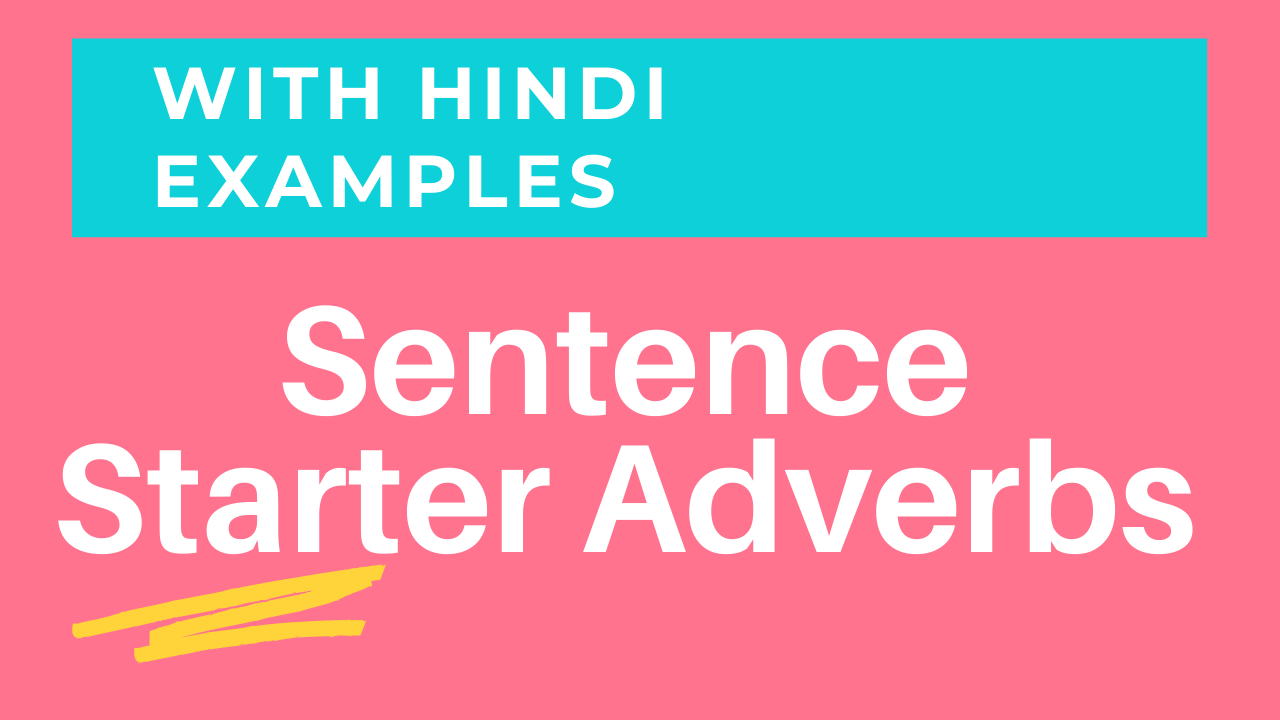The way you use sentence starter adverbs in your conversation makes a huge impact in the mind of your listeners. Common but impressive way using these adverbs in your day-to-day English leaves a deep and good impression. Do you know, how ?
Here are some of the commonly used sentence starter adverbs that everyone must be aware of.
The adverbs that we are going to learn can be used either at the beginning of the sentence or at the end of the sentence.
You have two choices and it’s upto you.
Sentence Starter Adverbs
1. Amazingly enough :
Meaning : (सबसे आश्चर्य की बात)
Use :
अपने हैरानी को प्रकट करते हुए किसी बात में कुछ और points को express करने के लिए उपयोग किए जाने वाले adverbs में से एक।
Example :
He has been missing for a week, amazingly enough he didn’t even inform his parents. (वह एक सप्ताह से लापता है और सबसे आश्चर्य की बात तो यह है कि उसने अपने माता-पिता को भी नहीं बताया।)
Amazingly enough, he got no reply from his senior. सबसे आश्चर्य की बात तो यह है कि उसे अपने सीनियर से कोई जवाब नहीं मिला।
2. Briefly : (संक्षेप में)
Use :
अपनी बात खत्म करके, फिर अपनी बोली हुई बातों को समेटते हुए कहना।
Example:
Identify tense of a sentence, framing them in right order with appropriate meaning briefly, ideas generating-ability is something that comes out from constant practice. (वाक्य का काल पहचानना, उनको सही क्रम में सजाना उनके सही अर्थों के साथ, संक्षेप में, ईडिया उत्पन्न करने की क्षमता जो बार बार अभ्यास से ही आता है।)
Briefly, we have to learn a lot of things to increase our English speaking skill. ( संक्षेप में, हमें अपनी अंग्रेजी बोलने की कला को सीखने के लिए बहुत सी चीज़ों को सीखना पड़ेगा। )
3. Broadly speaking : (सामान्य रूप से बोला जाए तो)
Use :
आमतौर पर जब कोई बात हो जिसमें अक्सर कोई चीज़ देखा या पाया जाता है तब हम ये बोलते हैं।
Example :
Broadly speaking women are having long hair than men. ( सामान्य रूप से बोला जाए तो औरतों के बाल आदमियों से लंबे होते हैं। )
Broadly speaking, men’s height is more than that of women. (सामान्य रूप से बोला जाए तो आदमीयों का कद औरतों से ज्यादा होता है। )
4. Surprisingly : (अचरज की बात यह है कि)
Use :
हैरतअंगेज होकर बोलना जैसे कि यकीन नहीं हो
Example:
Surprisingly, a boy of just nine years old was driving a car smoothly. (अचरच की बात यह है कि सिर्फ नौ साल का लड़का कार बढ़िया से चला रहा था।
Surprisingly, a lame horse won the race at the end. (अचरज की बात यह है कि एक लंगड़ा घोड़ा अंत में दौड़ जीत गया।)
5. Honestly speaking : (सच कहा जाए/इमानदारी से कहा जाए तो )
Use :
बिना कोई बेईमानी किए सच सच कहने का इरादा कर के बोलना।
Example :
Honestly speaking, Newzealand deserved to be the world cup champion in cricket. ( सच कहा जाए/इमानदारी से कहा जाए तो क्रिकेट विश्वकप का न्यूजीलैंड सही हक़दार था।
Honestly speaking, he is dear to me more than my own brother. ( सच कहा जाए/इमानदारी से कहा जाए तो वह मुझे अपने सगे भाई से ज्यादा अज़ीज़/प्यारा है। )
6. Personally : ( व्यक्तिगत रूप से )
Use : अपना खुद का राय या सोच, दुसरों का नहीं, तब हम इसका प्रयोग करते हैं।
Example:
Personally, I don’t prefer going to parties. ( व्यक्तिगत रूप से, मुझे पार्टी में जाना पसंद नहीं है।)
7. Obviously : ( स्पष्ट रूप से / ज़ाहिर है )
Use :
जब कोई बात साफ है, इसमें किसी तरह का संदेश ना हो।
Obviously, I can’t deceive my brother. ( ज़ाहिर है में अपने भाई को धोखा नहीं दे सकता।)
8. Sadly – ( दुःख की बात यह है कि )
Use :
बड़ी मायूसी या उदास मन से कहना।
Example :
Sadly, most of the students don’t event to speak in English. ( दुःख की बात यह है कि अधिकतर विधार्थी अंग्रेजी बोलने की कोशिश भी नहीं करते हैं।)
9. Unfortunately – (दुर्भाग्य से )
Use :
जब क़िस्मत ख़राब हो, भाग्य का साथ न हो। तकदीर को कोसते हुए।
Example :
Unfortunately, he has lost the money that he got as monthly payment. ( दुर्भाग्य से, वह पैसा खो दिया जो उसे तनख्वाह के रूप में मिले थे।)
10. Practically speaking – ( व्यावहारिक दृष्टिकोण से बात करें तो)
Use :
व्यावहारिक जीवन की बात करते हुए न कि किताबी जीवन की
Example :
Practically speaking, it’s almost impossible to be rich overnight. व्यावहारिक दृष्टिकोण से बात करें तो रातों-रात अमीर बनना लगभग असंभव है।
11. Seriously – (गंभीरतापूर्वक)
Seriously, we don’t like the way he talks. गंभीरतापूर्वक बता रहा हूं, हमें उसका बात करने का तरीका पसंद नहीं है।
12. Roughly speaking – ( मोटे तौर पर कहें तो )
Roughly speaking, Patna is 200 kilometres away from my city. मोटे तौर पर कहें तो पटना मेरे शहर से दो सौ किलोमीटर दूर है।
Here are some frequently used adverbs with Hindi examples sentences:
More Essential Adverbs
1. Early – जल्दी
I don’t get too early in the morning. मैं सुबह बहुत जल्दी नहीं उठता हूं।
I think, he got up early today. मुझे लगा वह आज जल्दी उठ गया।
I had to go on foot so I left early. मुझे पैदल जाना था इसलिए मैं जल्दी निकला।
2. Afterwards – बाद में / तुरंत बाद
He will come afterwards if you are busy at this time. अगर आप इस वक्त व्यस्त हैं तो वह बाद में आ जाएगा।
She left at 3 pm and soon afterwards they left. वह तीन बजे निकली और तुरंत बाद वे लोग निकले।
3. Rather – थोड़ा सा
That room is rather mess. वह कमरा थोड़ा गंदा है।
Food is rather salty. खाना में थोड़ा नमक है।
The previous book was rather boring. पिछली किताब थोड़ी बोरिंग थी।
Use of Ever in question
‘ever’ is mostly used in question sentences but not all the time. It is also used to show a bit of anger, frown or irritation. Let’s say that.
1. Who ever threw these bananas skins on me ? ये केले के छिलके मेरे उपर किसने फेंका ?
2. What ever do you mean ? क्या मतलब है तुम्हारा ?
3. Why ever ? OR What ever for ? क्यों भला ?
I will never go to America again. मैं फिर कभी अमरीका नहीं जाऊंगा।
Why ever not ? क्यों ऐसा ?




